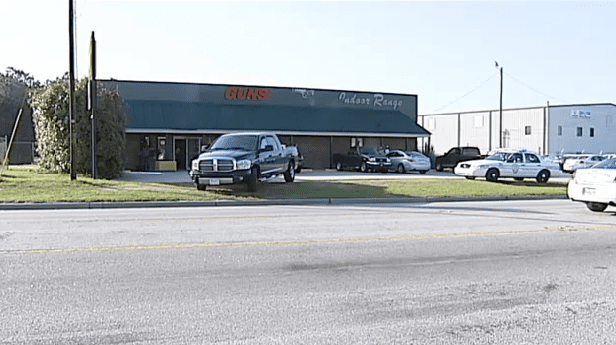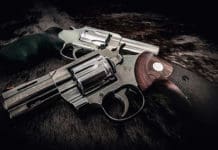“North Charleston police officers responded to Trader World Gun Shop on Cross County Road around 5 p.m. Monday and located a victim suffering from a gunshot wound,” South Carolina’s live5news.com reports. “According to witnesses at the gun range, Patteron was shooting on a lane when he stopped to inspect the weapon. He turned the handgun toward himself when it discharged, striking him. Patterson was taken to MUSC where he died a short time later.” Obviously, the gun didn’t discharge itself . . .
Truth be told—as it rarely is after a fatal negligent discharge—Patterson shot himself. He violated at least two of Col. Jeff Cooper’s gun safety rules.
Here’s the thing: Patterson was in a relatively low-stress environment. The odds of a negligent discharge increase arithmetically in a high-stress defensive gun use (DGU). “Keep your finger off the trigger until your sights are on the target” still applies when your life is at stake, only more so.
Always maintain rigorous trigger discipline, especially when training. And again, practice aiming your gun at the target and NOT firing. The life you save during a DGU could be your own. Or someone else’s—who wasn’t as much of a lethal threat as you first thought. [h/t to JeffD]





Hats off to a combined IGOTD and Darwin Award winner!
Perhaps so, but a tragedy nonetheless.
Of course. And as you point out in the article, an entirely preventable one.
Unbelievably harsh.
Yes, the truth often is.
Life’s rough; get a fvckin’ helmet.
http://www.youtube.com/watch?v=bvAvth2sMHc
Sounds like it might be a hang fire. Those are rare as hen’s teeth, but it happens.
Could be. Could be he saw a booger on the trigger.
Just what I thought to Mr. Leghorn, rare but not implausible… what other reason could one have for turning a loaded firearm towards your most prized possession (Yourself), absent mental defect.
No stoppage is a reason for pointing a loaded firearm at yourself.
Story once told to me by an officer in the Reserves: Range practice with SMGs. One soldier has a stoppage and immediately inverts the weapon and looks down the barrel. A precariously positioned casing was the only thing keeping the bolt from coming forward and firing. RSO just about shat.
some things just need to happen in order to protect genes like those from spreading.
oh. oh’k. i thought it was the other way around.
I’m thinking ‘hangfire’ and he did everything wrong in response.
Edit: Nick beat me to it. Is anyone else having issues with TTAG comments not updating in a timely manner on a page refresh?
2nd Edit: Must also acknowledge Foghorn’s expertise in matters regarding “hen’s teeth”.
And then there is always that possible sucide.
Can’t tell from the fact on hand, but suicides at ranges are surprisingly common. Especially public ranges where people can come in a rent time.
Which is why many of the ranges with rentals have a “no solo renters unless they also have their own gun already”
Such a sad story.
This is precisely why I no longer go to public ranges. You cannot trust the general public to practice gun safety.
The last time I went (two years ago) my 10 year old son’s head was covered TWICE by some wanna be gansta. No thanks. Now all of our practice is done out in the country.
I don’t understand why people frequent public ranges where safety is an issue. You wouldn’t let anyone point a loaded gun at you anywhere else, so why go to a range where you will get lasered by incompetent shooters?????????
The pro-2a movement is becoming a victim of its own success. As more and more people get involved in shooting, the average competency/intelligence of a randomly sampled shooter (such as the one you’d find at your local public range) converges on the mean (Central Limit Theorem), which, as democracy has shown us, is pretty darn low.
more people with guns = more idiots with guns (and more justified DGUs, safer streets, more freedom, etc. but that’s not what I’m getting at here)
So what can we do? Bring up the mean. And that means educate, educate, educate. Don’t be shy about pointing out gun safety mistakes. Post Col. Cooper’s rules at your shop, your range, etc. Tell stories. Chastise people. Heck, even argue with them (off the range). Who knows, your efforts might literally save a life. Nobody will thank you for being the ‘safety nanny’ or ‘all uptight’ or what have you, but its The Right Thing To Do(tm).
Yes. I had to yell at someone this past weekend for pointing a cocked revolver at her foot with her finger on the trigger.
We hesitate to call people out when they break the rules – out of politeness or fear of confrontation – but it needs to be done.
Everybody is a range officer. Everybody is a range officer. Everybody is a range officer.
If you see someone doing something unsafe with a gun, tell them to stop and tell them which rule they are breaking. If you’re not mature enough to realize you’re helping them, that’s their problem.
Seconded. And if one phrases it as a polite suggestion, it generally works well.
Agreed and agreed. My father made it a habit of his to always have a gentle word with folks around us if he saw a mistake. Never saw him yell or anything. As a kid, I thought he was being helpful… now that I’m older, I realize he was also worried about ME getting hurt, or seeing someone else’s bad habits.
Being polite and kind doesn’t negate being firm, either.
All the more reason to participate in public ranges!
I go to a private range, where unsafe shooters are immediately invited not to return.
And keep in mind, shootin’ out in the country isnt 100% safe, either. You might not get flagged, but some one in a public range probabally isnt going to jump you for your guns.
And you could get hit by an asteroid tonight, Dr. Good Lord.
public ranges….
I go to an indoor public county range and don’t have any unusual safety concerns. This particular range requires a 2+ hour safety class just to get a range card and the RSO’s are really on top of things. At a previous range, the range rules were covered in the time it took my credit card to be authorized for the membership fee.
I’m curious about this incident:
http://www.ktvb.com/home/Gun-range-death-ruled-an.html
The range is about 1 1/2 miles from where I live.
You beat me to it.
I have been to Impact on quite a few occasions and have rarely seen anyone being called on improper safety habits.
I have also seen cameras beside the register that are trained on the lanes, and according to the article it sounds like they are actually recording.
These two incidents sounds very similar from a basic reading of the two.
There it is again. As told by Degun Wentoff.
I see the article has been updated since I last read it.
The indoor public range I go to separates the members from the non-members with a cinder block wall. I didn’t know why at first but the few times I went as a non-member I quickly learned why they separated the two. I’ve seen unsafe things on the members side but not nearly as many. I’m still new to shooting and just reading the articles here and a lot of the comments I’ve learned a lot – thanks to TTAG and it’s readers.
I know training isn’t necessary (in NH) to buy a gun or carry and I know from comments here that many/most are against mandatory training (me too) but I took an excellent course as well as a couple follow-on courses and without those I’d probably have been one of those newbies I’d cringe being around. People that ask me about guns I encourage to take the course for their own safety and the safety of others. After all it’s only a fraction of the cost of a quality handgun and it was fun to boot.
Evolution in action.
While the rule “Keep your finger off the trigger until your sights are on the target” is commonly seen, in my opinion it is not adequate for all self-defense situations. In many confrontations, whether by police or private citizens, guns must be pointed at suspects/criminals and NOT fired unless the criminal takes some further, life-threatening action. Whilee one’s sights may be “on target” when the gun is pointed at a potential attacker, the finger should stay braced on the side of the frame or slide until THE DECISION TO FIRE has been made. Thus, the better rule is “Keep your finger off the trigger and outside the trigger guard until you are on target and have decided to fire.” This is the rule published by IALEFI (the International Association of Law Enforcement Firearms Instructors), and taught by many law enforcement agencies nationwide. I’ve worked as a police firearms instructor for the past 32 years, and as an expert witness in shooting and accidental discharge cases for the past 26 years. There are many reasons, some of them stress-related, why having one’s finger on the trigger in a defensive confrontation can lead to unintentionally shooting someone. I’ve personally worked in cases in which the “sights are on target” rule has resulted in unintentional killings under stress. I strongly urge defensive gun users to follow the “decision to fire” rule instead.
Comments are closed.